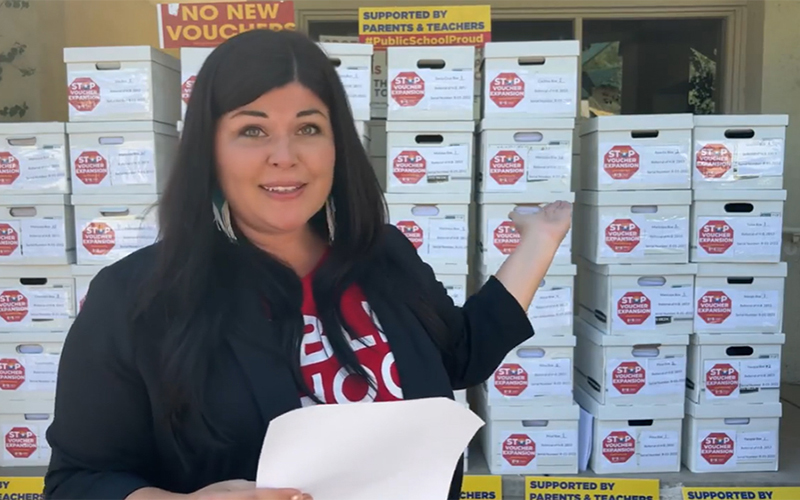WASHINGTON – The apparently successful petition drive that blocked an expansion of Arizona’s Empowerment Scholarship Accounts may not have been so successful after all.
Officials with Save Our Schools Arizona, who said Friday that they turned in thousands more signatures than needed to force a vote on the issue, conceded this week that they “definitely got the numbers wrong.”
And while they were not ready to admit defeat, they said they were not optimistic that the secretary of state’s office will find that they collected the 118,823 signatures needed.
“We fell short. We are, of course, awaiting the accurate number from the secretary of state’s office,” said Beth Lewis, executive director of Save Our Schools Arizona.
Lewis’ comments came Tuesday, one day after supporters of the universal ESA program said their own analysis of the petitions showed the number of signatures submitted was closer to 89,000 – well below the 141,714 SOS Arizona claimed it had.
It could be mid-October before the secretary of state’s office reviews “every sheet and every signature” to determine the actual number of legitimate signatures on the petitions, a spokesperson for the office said. She did confirm, however, that the office received 8,175 petition sheets, each of which can hold up to 15 signatures – 122,625 signatures at most, a cushion of just over 3%.
If there are more than 118,823, the law will be put on hold until 2024, when it would go before voters; if there are fewer, the expansion of the school voucher program will take effect immediately.

Beth Lewis on Friday, when Save Our Schools Arizona thought it was turning in more than 140,000 petition signatures to halt the state’s expanded ESA program. The final number could be well shy of that. (Photo courtesy Save Our Schools Arizona)
As of Sept. 19, the Arizona Department of Education said it had received more than 10,000 applications for scholarships under the expanded program.
The signature discrepancy was first pointed to by supporters of the ESA program, including the Goldwater Institute and the Center for Arizona Policy, who said petition organizers “radically overstated” the number of signatures submitted Friday.
“Our petition review team counted all the signatures,” said Joe Setyon, a Goldwater Institute spokesperson. “They double-checked every line to ensure accuracy.”
Goldwater Director of Education Policy Matt Beienburg said the institute was “participating in the process to make sure that there was an accurate count of the number of signatures.”
The current Empowerment Scholarship Account program gives taxpayer dollars to families whose children attend failing public schools or a school that cannot provide the services their children need. The families can use that money to pay for private or other nonpublic schooling.
The new law would expand that program to any family in the state, giving as much as $6,500 per child in exchange for not attending a public school. The law was sponsored by Rep. Ben Toma, R-Peoria, who said in a prepared statement Monday that “when funding follows the student, the performance of schools and students has improved.”
“Proponents of the failed referendum built their effort on the fallacy that public schools are harmed by Arizona’s ESA program,” Toma’s statement said. “That of course is untrue.”
The bill was the last signed into law by Gov. Doug Ducey – a move Lewis called “deliberate.”
“That took 10 days out of our 90-day window in which citizens are allowed to refer a bill, which may not sound huge to some people, but those 10 days … definitely broke our efforts,” Lewis said of Ducey’s delay.
She said her group of grassroots volunteers did everything in their power to meet the Friday deadline to turn in petitions, but were often confronted and “harassed” by supporters of the law as they tried to collect signatures.
Center for Arizona Policy President Cathi Herrod dismissed claims of harassment. She said it was a “grassroots group of parents organized to track the petition drive” who were merely trying to counter inaccurate descriptions of the law and “share the truth” about ESA funding.
Lewis praised the work of her volunteers, who she said were “operating under an extreme amount of stress and chaos.” She said she want people to understand “how just wild it is at the end.”
“We had petitions just flying in from around the state, we had folks coming up from Sierra Vista and Yuma and the Navajo Nation,” Lewis said.
Even if her organization ends up falling short on the petitions, she said, it is “not going to give up the fight.”
“There’s potential for litigation for future initiatives,” Lewis said. “We are not going anywhere, and we’re not stopping this fight for the future of public education in the state.”



